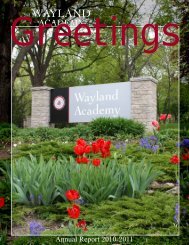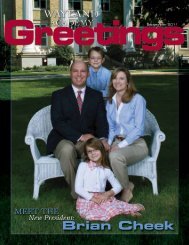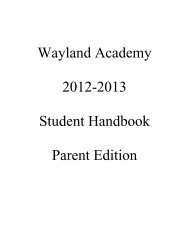Greetings XCI #2 - Wayland Academy
Greetings XCI #2 - Wayland Academy
Greetings XCI #2 - Wayland Academy
Create successful ePaper yourself
Turn your PDF publications into a flip-book with our unique Google optimized e-Paper software.
l<br />
According to Caldwell, the Assistant<br />
Conductor position “entails the<br />
musical preparation of singers for their<br />
performances. Private coaching,<br />
anything they need to improve their<br />
musical understanding of a role.” That<br />
sounds simple enough, but, in order to<br />
truly coach an opera singer at this high<br />
level, Caldwell has to exercise disparate<br />
skills simultaneously. For one thing,<br />
she has to be versed in a number of<br />
different languages. Caldwell noted,<br />
“As an opera coach one has to be, if<br />
not fluent, literate in French, German,<br />
and Italian, as they come up most<br />
frequently.”<br />
In addition, she has to rapidly<br />
transpose music that was written for<br />
an orchestra and play it on the piano<br />
while multi-tasking in a nearly<br />
unimaginable fashion. “If I’m coaching<br />
the singer in the role of Carmen, I<br />
need to sing all the other voice parts,<br />
so she can make her entrances while<br />
I’m playing the piano.” This means<br />
that, while playing music on the piano<br />
that was never meant for a piano, she<br />
must sing multiple roles in a foreign<br />
language while correcting someone<br />
else. And these corrections must be<br />
delivered in the most careful manner.<br />
In addition to linguist, musician, and<br />
coach, Caldwell often finds herself<br />
playing psychologist. “Singers,” said<br />
Caldwell, “are vulnerable creatures,<br />
entirely dependent on their instrument.<br />
There is not much work for them to<br />
begin with, and they have a pretty<br />
short shelf life. They have to be ready<br />
by thirty years old; youth is kind of<br />
everything these days. They need a lot<br />
of people to support them and make<br />
them look as good as possible.”<br />
Caldwell, herself, credits many people<br />
in her life for helping her achieve her<br />
current status as a musician and<br />
professor, and she looks back fondly<br />
on her time at <strong>Wayland</strong> <strong>Academy</strong> as a<br />
day student. “I’m grateful for my<br />
<strong>Wayland</strong> education. I had three<br />
tremendous music teachers: Connie<br />
Koehne even before I went to <strong>Wayland</strong>,<br />
and she continued to be a great mentor<br />
and influence, and I studied piano with<br />
Mr. Kahn and the organ with Mr.<br />
(Franklin) Stecker.”<br />
She credits these and other teachers<br />
for guiding her in the right direction<br />
and creating opportunities for her.<br />
“The training for a musician is not<br />
always as straightforward as for other<br />
fields; you have to get an early start,”<br />
said Caldwell. During her time in<br />
Susan Caldwell `73 (center) with her students in the opera<br />
program at the Mannes College of Music<br />
Beaver Dam, she would sometimes<br />
accompany the choir on the chapel<br />
organ, and Mr. Stecker made her his<br />
assistant at First Lutheran Church in<br />
Beaver Dam. She performed with the<br />
Beaver Dam Community Symphony<br />
and was part of a group that called<br />
itself the New Baroque Jazz Trio. “I<br />
had so much professional experience<br />
even before I went to college. A lot of<br />
responsibility was entrusted to me at<br />
<strong>Wayland</strong>, and in other places that<br />
might not have been possible.”<br />
Her education at <strong>Wayland</strong> provided<br />
Caldwell with four years of French and<br />
enough Advanced Placement credits<br />
that she was able to test out of classes<br />
at St. Olaf College, opening doors to a<br />
number of other courses and allowing<br />
her to accelerate. Since then, music has<br />
taken her all across the United States<br />
with further schooling and experiences<br />
from San Francisco to Michigan to<br />
Georgia. For a brief spell, she found<br />
herself on a Cunard cruise line as part<br />
of an opera trio.<br />
Today, she works with some of the<br />
most talented young singers from<br />
around the world, sometimes even<br />
performing with the New York City<br />
Opera. “If there’s a keyboard in the<br />
orchestration I will<br />
sometimes play<br />
that in the<br />
performances. For<br />
instance, recently<br />
during Puccini’s<br />
Tosca, there’s a<br />
very thrilling part<br />
in the opera,<br />
where I had to run<br />
from playing<br />
celesta in the pit,<br />
get in an elevator,<br />
ride that to the top<br />
floor, climb a<br />
ladder, and play<br />
the organ over the<br />
stage.”<br />
All of that sounds<br />
truly exciting, but<br />
the way Susan<br />
Caldwell speaks about music reveals<br />
that her art is more than just an<br />
exciting job. “It isn’t just our career.<br />
It’s who you are. Sometimes I have to<br />
remind myself that for many, many<br />
people, even if they have a career, it’s<br />
still just what they do. There’s<br />
something about music that fills your<br />
every atom.<br />
“Music transforms people. When I’m<br />
working you can be sure I’m not<br />
thinking about anything else, and<br />
worries and anxieties all leave your<br />
mind. I realize more and more how<br />
blessed I am to have this career.”<br />
www.wayland.org 9<br />
ALUMNI ARTISTS








